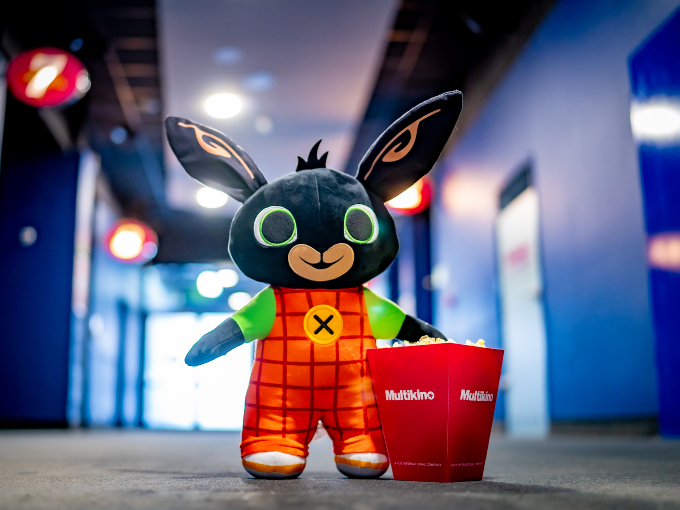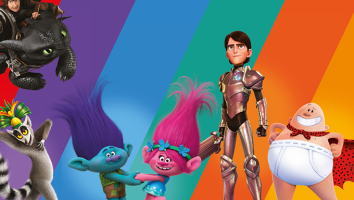The need to sell content everywhere due to growing fragmentation in the children’s entertainment industry is a constant reality. But how many companies are truly optimizing fringe audience touchpoints for sales when more traditional media channels—TV, SVOD and, most recently, FAST—continue to command the most attention for dollars?
Two companies that haven’t shied away from exploring alternative avenues for growth, despite the urge to focus on safer bets, are Irish distributor Monster Entertainment and London-based prodco Acamar Films.
Up in the air
Monster is a brand management company that has been developing entertainment brands for worldwide distribution since the ’90s, with children’s animation as its core business. The company has sold a raft of content across TV, DVD, OTT, merchandising and publishing platforms, but it has also found success in a historically tricky market: in-flight entertainment.
Monster started selling shows to airlines in 1999 because they were looking for live-action music shows, and the distributor’s Planet Rock Profiles was available. Over the next decade, nearly 100 airlines ended up acquiring the series, making it a hit in the in-flight entertainment space. Animation, on the other hand, was a tough sell at the time, recalls company owner Andrew Fitzpatrick.
“Every time I mentioned animation, they would say they had an output deal with Disney, for example, or that Warner gave them all of their animation for free on the back of a movie package,” says Fitzpatrick. “In a few instances, some would even say they didn’t really care about animation because kids weren’t buying airline tickets.”
In-flight entertainment has obviously changed a lot since then, as airlines pivoted from offering a few single screens for everyone, to providing an entertainment system on the back of each seat. Having more screens for more traveling families has helped extend the length of the average kids in-flight content deal from about two months to nearly a year, says Fitzpatrick.
He has also seen the airlines warm up to animation, especially at APEX Content Market, the industry’s leading content-buying event. “Just by being at the market every year and talking about animation, the airlines gradually became a bit more open, especially if their deals with the bigger studios had expired. It is difficult, though. If you only have animation, you probably won’t do any business. But for us, we’ve stuck it out and built a pretty good business in terms of animation sales.”
Of course, Monster’s strong in-flight business took a turn for the worse during the pandemic when airlines had to temporarily ground their fleets. But after attending a busy APEX market in Istanbul this past April, Fitzpatrick says the business is finally returning to normal. “The volume of business in terms of the amount of content airlines are acquiring is almost back to where it was pre-COVID,” he says, although license fees aren’t quite back to pre-pandemic levels, when airlines normally paid between US$1,000 and US$1,500 per half hour.
To boost its airline business post-pandemic, Monster is taking advantage of higher demand for kids and family movies on flights. A feature film deal can be worth up to 10 times more per minute than a half-hour series deal, so the incentive is there, says Fitzpatrick. “We weren’t doing features at all for airlines pre-pandemic, and we now sell 23 of them,” he notes.
Last year, Monster picked up the in-flight distribution rights to Oscar-nominated movie Wolfwalkers from Irish prodco Cartoon Saloon, and to date has sold it to more than 25 airlines, including American, Virgin Atlantic, Emirates, Aer Lingus, Lufthansa and Korean Air.

Monster Entertainment has sold the Oscar-nominated film Wolfwalkers to 25-plus airlines since picking up the in-flight rights last year.
In 2022, the company also acquired in-flight rights from distributor GKIDS for 21 animated features, including another Cartoon Saloon Oscar nominee, Song of the Sea, and Brazilian Academy Award-nominated feature Boy and the World. This year, Monster returned to Cartoon Saloon to secure the in-flight rights to Puffin Rock and the New Friends, in partnership with sales agent Westend Films.
Looking ahead, Fitzpatrick says the biggest challenge for Monster in terms of in-flight sales is getting airlines to focus on its content.
“We’ve had some good success, but getting their attention is an ongoing challenge when you consider the sheer volume of content that is on o er to airlines all the time.”
Some of the kids genres that are popular for airlines right now include nostalgia shows, educational titles, influencer-led shows from digital-first channels and programs featuring underrepresented groups, says Emma Gunn, director of acquisitions and content partnerships at Spafax, a global travel media agency that specializes in acquiring in-flight content for airlines from distributors like Monster.
“We also see exciting opportunities for more gamifi cation and interactive programming,” says Gunn. “For example, with consumer products and improved interactive user interfaces, passengers will benefit from a more engaging in-flight entertainment experience that refl ects current trends.”
Back on the ground
As for other fringe opportunities in the kids space that complement more traditional media, Acamar Films has had success on the big screen for the past five years with its specially produced Bing theater experiences (pictured at top).
Targeting preschoolers and their families, the morning matinee events kick off with Bing-themed games, face painting and coloring activities, meet-and-greets and entertainment by local performers. Toddlers are then treated to a 65-minute feature film consisting of seven popular episodes from the 104 x seven-minute CG-animated series, intertwined with 15 minutes of exclusive additional animation.
Since the majority of the content isn’t new, Acamar o ers a ordable pricing: two tiers of seating at around US$4 and US$5. “It would be unfair to charge the price of a brand-new feature,” explains Eroulla Constantine, the company’s director of sales and distribution.
The latest experience—Bing and his Friends at the Cinema—is one of four Bing cinema packages Acamar has produced. The first, Bing at the Cinema, premiered four years ago in the UK at 83 cinemas, in partnership with theatrical exhibition company Vue. Bing’s Christmas and Other Stories arrived a year later, followed by Bing’s Animal Stories in 2021.
To date, Acamar has launched the experiences in the UK, the Netherlands, Poland and Italy—European markets where Bing has had the most success across traditional media, streaming and consumer products.
“Once we achieve a certain audience a nity in a territory, we look at how we can build on that in the cinema space,” explains Constantine. “Theatrical adds another access point for kids to enjoy Bing, and it also raises our profi le from a brand perspective.”
In terms of numbers, more than 200,000 tickets have been sold to date across all of the packages, with more than 45,000 attendees in the UK alone for Bing’s Christmas, according to Constantine. “That was our biggest sellout. Meanwhile, we have proved our staying power in markets like Poland, where Bing’s Animal Stories was extended from six weeks to 25 weeks.”
Beyond Bing’s existing popularity in these territories and the value of the brand’s event experiences, the packages have also performed well because their 10 a.m. start times work for parents with toddlers who usually wake up very early and may need something fun to do halfway through their morning. “It’s also a time of day when cinemas don’t see much business for more grown-up fare, so it fits quite perfectly,” says Constantine.
The packages have had the most success in Poland and the Netherlands—territories where the idea of introducing very young children to event cinema is well established and trusted, she adds.
“Our biggest challenge with the packages is that in many territories, there isn’t necessarily an event cinema culture. So theaters o er a lot of the usual general releases, but not this sort of preschool block element. We hope this grows in many regions in and out of Europe.”
Long term, Acamar’s big ambition is to have cinema releases wherever Bing is found—and the show currently airs in 130 territories. “Localization is a key priority for us as we build Bing into a global success and an evergreen title,” notes Constantine.
For Fokko Vonk, who has worked with Acamar and Dutch family-film distributor In the Air on three Bing features as owner of Amsterdam-based distributor Just4Kids, the preschool package has the potential to fill industry white space as an affordable way to bring TV series into the cinema.
“It’s often really diffcult to find something for three-to five-year-olds in theaters,” says Vonk. “But if you have a popular preschool TV show, offering a stitched version for cinemas is a very interesting way to bring your series into a territory. Plus, these are often kids’ first cinema experiences, so it’s good for the future of the theatrical market and for children, too.”
This story originally appeared in Kidscreen‘s October/November 2023 magazine issue.



























